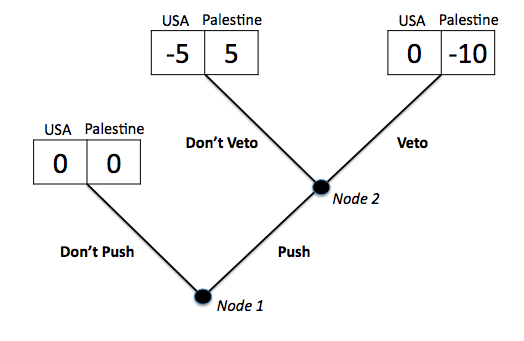Game Theory in the Vote for Palestinian Statehood
In the wake of the 2011 United Nations General Assembly, no other issue dominates the agenda more than the vote for Palestinian statehood. From September 21st to the 27th, UN member nations will meet in New York to decide if Palestine will indeed become a recognized state. That would change the Israeli-Palestinian conflict dramatically, as Israel now would have to deal with an actual state instead of a settlement of people in its own territory. This is not in Israel’s interest, and as its ally – the United States – has the power to veto the resolution on Palestine’s statehood once it reaches the Security Council. While the Palestinian Authority seeks what would be the most impactful action in the Israeli-Palestinian conflict in years, the US has to decide whether it will keep supporting its longtime ally in defeating such resolution.
We can attempt to analyze what will happen in the next few days in the framework of game theory. Given two players (Palestine and the US), here is what this game would look like:
In the first stage of this game (node 1), Palestine has the option of pushing the vote for its statehood in the UN. If it does not push the vote, the situation in the region will remain relatively the same, and the US and Palestine will both leave this game with no gains or losses. However, it seems likely that Palestinian leader Mahmoud Abbas will push for the vote, so let us then consider the expected values for Palestinians in this stage of the game. Let us say p represents the probability the US does not veto the vote for statehood in the Security Council, and that (1 – p) represents the probability it does veto.
E (Payoff to Palestine | Don’t Push) = 0
E (Payoff to Palestine | Push) = 5p – 10(1–p)
For it to be worth pushing the vote, the expected value of pushing the vote has to be greater than the expected value of not pushing the vote.
5p – 10 + 10p > 0
p > 1/3
This means that Palestine should only push the vote if the probability that the US does not veto the resolution is greater than 1/3. Since that does not seem to be realistic from a political standpoint, let us consider the next step of the game.
In the case Palestine does push for a vote, the US is left with the option of vetoing or not vetoing the resolution (node 2). The reality is that the US is a historical ally of Israel, and any move against Israel would have huge domestic political costs for the current administration within the Jewish American communities in states like New York and California. Therefore, we can argue that the payoff structure hereby presented shows that vetoing is the strictly dominant strategy. If the US is a rational player, it will indeed prefer a veto.
To the Palestinians, a veto could potentially create instability within the region as the population might see this as a step backward in the path to peace. To the US, not vetoing represents a political loss at home and in Israel. Given the chances of a veto are likely, Palestinians may resort to the General Assembly to gain the 2/3 majority it needs to be recognized as a state with “observatory status”. Regardless of what happens in the coming days, this game can shed some light on the political decisions that the US and Palestine will make.


I would respectfully submit that without more careful though to the relative magnitudes of the payoffs, and fully describing the action tree, this sort of political game theory analysis is useless. A general guideline is that if an analysis blatantly portrays an entity acting against its own self-interest, then the analysis is probably flawed in some way.
EG, if (Push, Veto) leads to payoff (0,0), and US plays pure strategy Veto, then Palestine had better play Push (trembling-hand equilibrium).
Similarly, allowing an additional node after (Veto), to recognize the possibility of taking the vote to the General Assembly, can change the result. Perhaps the actions and payoffs behind that might be (Push Again, Drop). Drop would lead to (0,-10). Push Again would lead to another node, representing a GA vote. This would introduce many players with their own beliefs into the equation, but to simplify allow the GA to have some probability q of Approving, and 1-q of Denying. If, say, Approving has payoff (-10,10) and Denying has payoff (5,-20), you can clearly see that the proper actions at previous nodes depends heavily on q, as well as the magnitudes at each of the end nodes. Palestine may develop incentive to Push under these conditions.